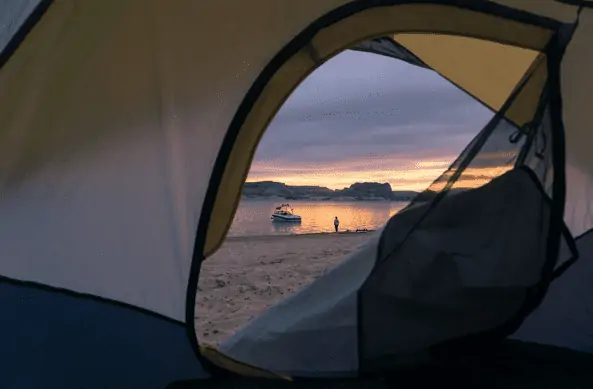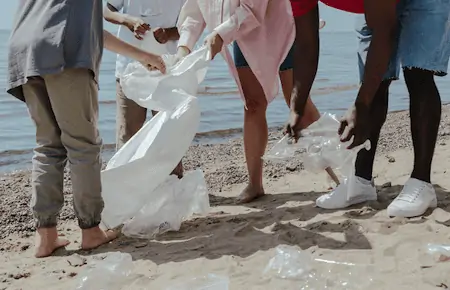Camping on pristine beaches can be enjoyable like any other form of camping. You can witness nature at its best by merely watching the rolling waves and feeling the sea breeze.
Explore the water and place along the coast and be captivated by the seascape and every fauna and flora you will discover.
Preparations and safety measures are always part of every trip. Learn how to avoid high tides, deal with sand and anchor your tent firmly.
What To Do Before Your Trip
Do your research first and know the rules and regulations of the site.
Find out if it is legal to camp in the area and if it is close to amenities, the activities you can do, if pets are allowed, and if RVs are allowed.
Ensure that the place is safe, and security has not been an issue.
A few days before your trip and on the day of the trip itself, monitor the weather to know what kind of clothes or gear to bring to ensure that your trip will be eventful.
#1. Research About The Area
Look for sites where camping is legal and learn about their rules and regulations to ensure safety. Your choice for a beach campsite will also depend on the kind of water activity you or your family intend to do.
Some beaches are suitable for swimming but not for longboarding, surfing, or fishing. If you bring along some kids, make sure that the area is kid-friendly. There are private and public beach campsites.
Private beach campsites are owned by people or companies and may require an early booking and are available on a first-come-first-served basis, while public campgrounds are generally open to everyone.
It is best to contact the park rangers in charge of the park or beach before hitting the road.
#2. Check The Weather
Be informed about the weather condition and check if there are chances of rain, storm, high tide occurrences in the area, or temperature highs and lows.
Do not ignore weather forecasts if you do not want to risk being in the middle of a storm or heatwave during your trip.
#3. Pitch Your Tent Above The High Tide Mark
Camp in a safe area and pitch your tent above the high tide line. To ensure your safety.
You can install a mobile application that gives alerts on high tide and low tide occurrences to ensure your safety.
The last thing you want to happen is to have seawater creep up your tent and drench you while asleep.
#4. Use Sand Stakes To Anchor Your Tent
The beach sand is often soft, making it challenging to peg a tent. Use sand stakes that are wider than normal stakes to secure your tent to the ground.
You may also fasten your tent on sacks filled with sand on rocks you find in the area.
Your tent can resist the wind if it has been properly anchored on a stable surface.
#5. Have A Layer Of Protection During Your Sleep
Pack along with you a comfortable self-inflating sleeping pad during your trip. You will need protection against the cold sand surface during the night.
The sand becomes hot during the day, but as night falls, the ground becomes cooler which can cause tremendous discomfort if you are not using the right gear.
#6. Keep Sand Out Of Your Tent
A dustpan and a broom will come in handy when dealing with sand. Use these to sweep sand that makes its way inside your tent.
You may also place a doormat at the entrance of your tent to wipe away the sand before entering.
Additionally, having a bucketful of water to wash your feet can be another option. Pat them dry with a towel afterward.
#7. Use Sunscreen
You may be exposed to harsh sunlight, so you will need to wear protective clothing or apply waterproof sunscreen often when you are out on the shore to avoid sunburn and the damaging effects of the sun on the skin.
Besides being fabulous fashion accessories, a wide-brimmed hat and a pair of sunglasses can shield your eyes from the UV rays.
#8. Dig A Fire Pit
Since beaches are predominantly windy, you will need a barrier to keep your campfire burning.
If allowed, dig a smokeless fire pit that is around 1 foot deep. It is wise to bring your firewood unless there are dry driftwoods you can collect nearby.
When not in use, extinguish the fire using water to prevent untoward incidents like bushfires.
#9. Stay Away From Sand Dunes
Stepping on sand dunes can damage the vegetation that holds them together. Sand dunes serve as barriers against storm surges and high waves.
Stay away from sand dunes and only walk on designated pathways.
#10. Prepare For The Unexpected
You will need to be ready for emergencies when on the beach. Pack a first aid kit and be constantly on the safe side.
#11. Keep Insects At Bay
The beach is home to many insect species that can harm or irritate anyone, so pack your bug spray and mosquito nets to keep them at bay.
#12. Leave No Garbage
With the tremendous increase of people looking for an escape to nature, campsites, including beaches, are trashed.
We must pick up after ourselves and treat the environment with respect by not leaving any litter.
Prepare A List Of Essentials
Make sure to list down all the supplies you need when planning a trip. If you drive to the beach, weight and space won’t be an issue.
Otherwise, you have to pack wisely by focusing only on items you can carry in your backpack.





